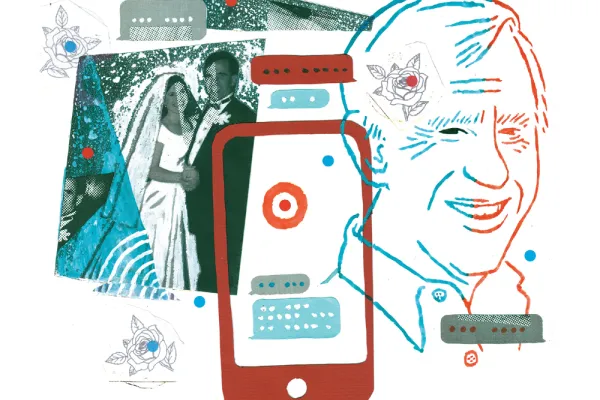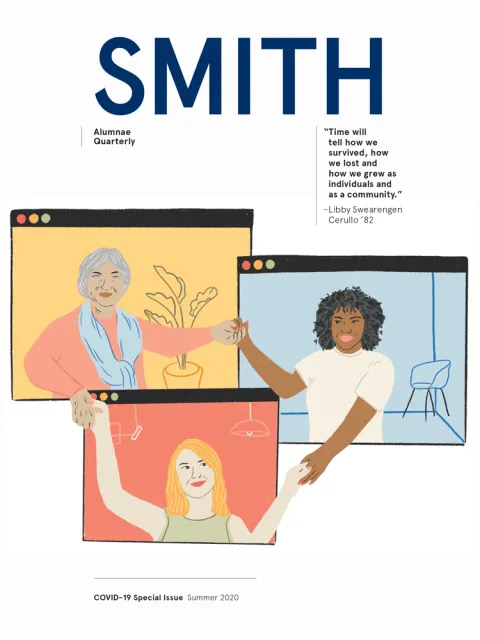The Morning Call that Never Came
Campus Life

Published June 18, 2020
I still have the texts.
“I know I speak for both of us,” my sister Katharine wrote to Dyane, the head of the memory-care ward at Dad’s assisted-living facility, at 8:21 a.m. on March 24. “Even if Dad can’t speak, we’d like you to hold the phone up for him so he can hear us tell him we love him.”
“Good morning, ladies, I need a little more time. I’m serving breakfast now,” Dyane quickly replied.
“No rush,” I wrote.
The next text from Dyane came at 11:21 a.m.: “My condolences to the both of you.”
We didn’t know it at the time, but Dad had become the first resident of his facility to die of COVID-19. We’d wait another week before the test results came back, and we could finally take his ashes home.
What happened before, during and after that morning will forever haunt me. I think back to Thursday, March 19, and the frantic late-night phone calls after Dad spiked a fever of 103, ultimately resulting in the decision to keep him away from the hospital for fear of exposure to the virus. I think back to my request to schedule an “in-person” call with him on Friday, March 20, where we could sit in the building’s courtyard and see him through glass doors. I couldn’t get a slot that day because too many families had already signed up. I think back to Saturday, March 21, when I was trying to get through to Dad and he wasn’t answering. He finally called back—when I was standing in the home-goods aisle at Target. I remember feeling frustrated because I couldn’t understand anything he was saying. I thought he was just sleepy from his nap, though I’d learn later that delirium often results from low blood oxygen. It was a short conversation, needless to say. It was the last one we’d ever have.
Kathy tells me she had a similar phone experience the next day, so she did most of the talking. Thank goodness she’d managed to tell him that our stepbrother had finally gotten engaged to the love of his life, because two days and two unsuccessful phone attempts later, he was gone—apparently of a sudden heart attack that’s known to accompany the virus.
It’s not supposed to be like this. Our dear dad, the sweetest man who always had a smile on his face and in his voice. “Hi, Jennie! It’s your dad!” was how nearly every call started. He unfailingly thanked us for our help and support as he endured the grim progression of Parkinson’s and dementia that landed him in memory care on March 12, the day before we were banned from visiting. Why didn’t I spend more time with him that day after I placed his furniture and hung his pictures? Why didn’t I call him more often during those final 12 days? Why? It’s my new least-favorite word.
When his death was entered into the public record on April 3, Sterling Ruffin Maddox Jr. became one of 275,367 confirmed COVID-19 cases and 9,246 deaths nationwide, according to Johns Hopkins University. Six weeks later, with 1.2 million cases confirmed and more deaths than the Vietnam War, I feel a sense of loss that I imagine must echo what families felt during wartime. Grieving the death of someone so close is visceral and wrenching in any circumstance, but it takes on new dimensions when your personal tragedy becomes a public statistic. The Washington Post interviewed my sister for a series on families who’ve lost loved ones. The AARP interviewed me for a story about how the pandemic has changed the way families mourn. We’ve developed talking points accordingly:
“It was a gift—Parkinson’s and dementia had erased his quality of life.”
“He would have preferred it this way.”
“We’ll have a big party for him when this is all over!”
These oft-repeated lines are at once a shield from my own sadness and a balm for those who think I should be falling apart. They provide a necessary arsenal against the daily on-slaught of grim headlines. But then I walk into my closet, where Dad’s shirts are still in the dry-cleaning basket. I can still smell him when I hold them up to my nose. Across the room, a small green cloisonné urn with some of his ashes has joined a sterling-silver cigarette box, engraved with the names of my mother and her bridesmaids on my parents’ wedding day in 1963. Another box on my dresser holds locks of my mother’s—and now my father’s—hair.
Objects and artifacts have replaced phone calls and Sunday dinners.
Dad’s best friends, Ron and Pete, have shared many memories with me and my husband during the walks we’ve taken since his death—outings that remind me of heartier days when all five of us used to go running every weekend. These walks have been therapeutic for us all, but I can’t shake one comment Pete made as we were talking about the childlike pain of loss that strikes once both parents are gone: “We’re all orphans now.”
Jennifer Sergent ’91 is a frequent contributor to the Smith Alumnae Quarterly.
This story appears in the Summer 2020 issue of the Smith Alumnae Quarterly.

A Semester Like No Other: How the class of 2020 left campus with a proper send-off.
Smith’s All-Hands Crisis Response: Entire campus community takes up an array of challenges presented by a dangerous pandemic.
Connection Out of Isolation: 12 voices collaborate on a poem for our time.
Mission to Make Masks: Students, staff rev up sewing machines to fill a community need.
One Student: Studio art major Sophie Willard Van Sistine ’22 finds her niche writing comics.
Race for a Vaccine: Dr. Annie De Groot ’78 and her biotech firm are on the front line to stop COVID-19 in its tracks.
Virtual Togetherness: Quarantines fall away as Smith friends Zoom into one another’s living rooms.
Echoes of a Pandemic: From canceled classes to campus quarantines, effects of the 1918 Spanish flu ring familiar.
Finding the Funny: An improv comedian’s tips for staying sane in the pandemic.
How Can I Help? From online classes to concerts and community fundraisers, alumnae find creative ways to ease the burden of those in need.
The Morning Call That Never Came: Death of a parent in the age of COVID-19 carries an extra layer of grief.
Racialization of Infectious Disease: As viruses spread, so does discrimination against marginalized groups.
Dawn of a New Day: Faith leaders impart messages of hope, acceptance and belief in our collective power to work for a better world.
Illustration by Adam McCauley